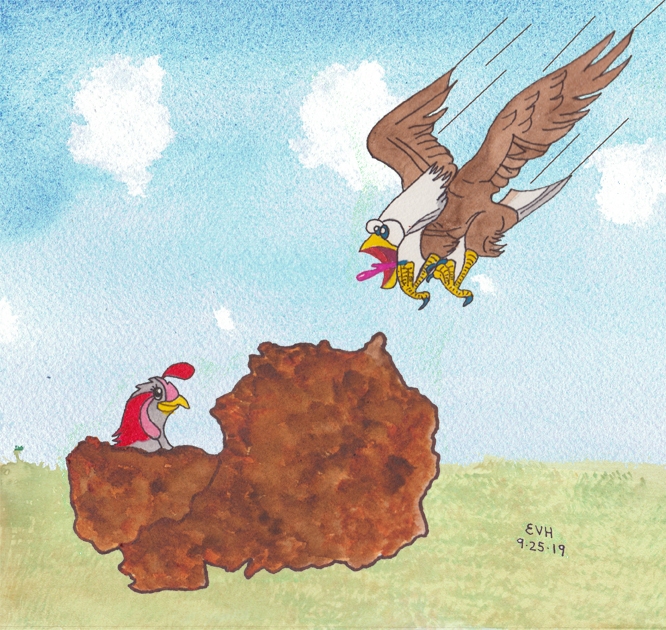
Jataka 168
Sakuṇagghi Jātaka
The Falcon
as told by Eric Van Horn
originally translated by William Henry Denham Rouse, Cambridge University
originally edited by Professor Edward Byles Cowell, Cambridge University
In this story we learn that the monastics at the time were assigned specific areas of the city in which to go for alms. The Buddha warns them to stick to their assigned districts. But then he uses this as a metaphor for refraining from sense pleasures, for by giving into sense pleasures you are outside of your district - in enemy ground – where Māra can attack you!
I do have one objection to this story and that is that I happen to like falcons!
“A quail was in his feeding ground.” The Master told this story while he was at Jetavana. It is about the bird teaching.
One day the Master called the Saṇgha, saying, “When you seek alms, monks, keep each to your own assigned district.” And repeating that sutta from the Mahāvagga (a section of the monastic code) which suited the occasion, he added, “But wait a moment. In the past others - even in the form of animals - refused to keep to their own districts, and by encroaching on other people’s lands, they fell into the hands of their enemies. Then by their own intelligence and resources, they got free.” With these words he told them this story from the past.
Once upon a time, when Brahmadatta was the King in Benares, the Bodhisatta was reborn as a young quail. He got his food by hopping about over the clods of earth that were left after plowing.
One day he thought he would leave his feeding ground and try another. So off he flew to the edge of a forest. As he picked up his food there, a falcon saw him. Attacking him fiercely, the falcon caught him.
Held prisoner by this falcon, our quail bemoaned, “Ah! How very unlucky I am! How little sense I have! I’ve encroached on someone else’s land! Oh that I had kept to my own place where my fathers were before me! Then this falcon would have been no match for me, I mean if he had come to fight!”
“Why, quail,” the falcon said, “where is the place where your fathers fed before you?”
“A plowed field all covered with clods of earth!”
At this the falcon, relaxing his grip, let go. “Off with you, quail! You won’t escape me there, either!”
The quail flew back and perched on an immense clod of earth, and there he stood, calling, “Come along now, falcon!”
Straining every nerve, poising both wings, down swooped the falcon fiercely upon our quail. “Here he comes with a vengeance!” the quail thought. And as soon as he saw him in full swoop, he just turned over and let him strike against the clod of earth. The falcon could not stop himself and struck his breast against the ground. This broke his heart, and he fell dead with his eyes staring out of his head.

Figure: Crash and Burn

When this tale had been told, the Master added, “Thus you see, monks, how even animals fall into their enemies’ hands by leaving their proper place. But when they keep to it, they conquer their enemies. Therefore take care not to leave your own place and intrude upon another’s. Oh monks, when people leave their own station Māra finds a door, Māra gets a foothold. What is foreign ground, monks, and what is the wrong place for a monk? I mean the Five Sense Pleasures. What are these five? The lust of sight, the lust of touch, the lust of taste, the lust of sound, and the lust of smell. This, monks, is the wrong place for a monk.” Then growing perfectly enlightened he repeated the first stanza:
“A quail was in his feeding ground, when, swooping from on high.
A falcon came, but so it fell he came to death thereby.”

When the falcon had perished, the quail came out exclaiming, “I have seen the back of my enemy!” He perched on his enemy’s breast and gave voice to his exultation in the words of the second stanza:
“Now I rejoice at my success; a clever plan I found
To rid me of my enemy by keeping my own ground.”
This discourse at an end, the Master declared the Four Noble Truths. At the conclusion of the declaration many monks attained stream-entry. Then the Master identified the birth: “Devadatta was the falcon of those days, and I was the quail.”
